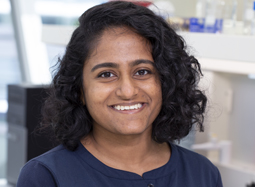From Malaysia to Michigan, a quest to improve outcomes for breast cancer patients
July 10, 2019

Kajang, a bustling city on the outskirts of the Malaysian capital of Kuala Lumpur, is a long way away from Grand Rapids, Michigan. But for Menusha Arumugam, a doctoral student enrolled in Van Andel Institute Graduate School (VAIGS), both cities are home.

Arumugam is part of a community of international students who come to the Institute from all over the world to train as the scientific leaders of the future. They hail from diverse backgrounds and cultures, but they are bonded by a common desire to use their talents and skills in the service of something they all feel strongly about — the idea that great science can change the world for the better.
Arumugam’s love of science comes from a deep desire to help people. As a young student growing up in Malaysia, Arumugam had dreams of becoming a doctor and helping cure people suffering from disease.
“When I was a student in high school, I shadowed a doctor and, while I liked the idea of improving human health, I quickly learned that I was really interested in figuring out how the diseases come about and how we can improve treatments for patients,” Arumugam said.
“When you’re a scientist working in a lab, sometimes you can forget why you’re doing what you’re doing,” Arumugam said. “In our lab, the work might directly impact patients, and I think when you’re constantly reminded that your work impacts real people, you’ll never lose the passion for what you’re doing.”
From that moment on, Arumugam has worked toward her goal of being a scientist. That choice led her to leave her hometown of Kajang to study, first at the University of Michigan–Flint, and now at VAIGS.
“When I received a scholarship from the Malaysian government to study abroad, I decided to come to Michigan to further my education,” Arumugam said. “Grand Rapids is such a great city, and the Institute’s location on the Medical Mile allows for a lot of collaboration with other scientists, clinicians and organizations like Michigan State University and Spectrum Health.”
Arumugam works alongside a team of scientists in the laboratory of physician-scientist Dr. Matt Steensma, an expert in orthopedic oncology and rare diseases such as Neurofibromatosis Type 1 (NF1). This direct connection between research and patient care is something that Arumugam loves about her work in the Steensma lab, where she studies breast cancer in NF1 patients.
“When you’re a scientist working in a lab, sometimes you can forget why you’re doing what you’re doing,” Arumugam said. “In our lab, the work might directly impact patients, and I think when you’re constantly reminded that your work impacts real people, you’ll never lose the passion for what you’re doing.”